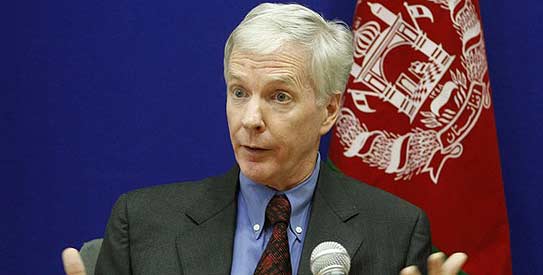
KABUL: The Taliban must feel “more pain” for peace talks to progress, the US ambassador to Kabul said, as Afghans Friday marked a decade since the death of an iconic anti-Taliban fighter two days before 9/11.
Veteran diplomat Ryan Crocker indicated that insurgents needed to face increased military pressure while admitting that efforts to talk peace with them had so far failed to produce concrete results.
“The Taliban needs to feel more pain before you get to a real readiness to reconcile,” Crocker, who started his job in July, said in an interview with the Wall Street Journal.
His comments came despite the presence of most of the 33,000 US “surge” troops ordered into Afghanistan in late 2009, and underlined shaky progress in finding a political solution to the war.
Early withdrawals of some of the 140,000 foreign troops in the country have already begun, with all combat forces due to leave by the end of 2014.
The remarks were published on the day Afghans marked the 10th anniversary of the death of Ahmad Shah Massoud, a charismatic commander who led the last bastion of resistance against the Taliban and was killed by an al Qaeda bomb.
Some experts say the assassination was linked to the September 11 plot as an al Qaeda plan to ensure Taliban leader Mullah Omar would continue to support them after the Twin Towers attacks, despite the certainty of US retribution.
Others argue it came at Omar's behest as the Taliban sought to wipe out Massoud's Northern Alliance, without him knowing in advance about al Qaeda's plan to stage the 9/11 attacks.
Northern Alliance fighters joined the United States in the October 2001 invasion of Afghanistan to topple the Taliban. But the Islamist militia revived in the years since to drive the ongoing insurgency against US-led troops.
Massoud, known as the “Lion of Panjshir”, is still revered in many parts of Afghanistan and the date of his death is a national holiday.
In Kabul, Afghan President Hamid Karzai failed to make a public appearance to mark the anniversary amid even tighter security than usual across the city.
At a landmark city roundabout named after Massoud, around 200 people gathered chanting “Long live Massoud, we follow your way” while carrying black flags in mourning.
Other government officials gave speeches remembering Massoud.
The 10th anniversary of Massoud's death has put the spotlight back on what progress is being made in the Afghanistan war after a decade of hard sacrifice.
The war has cost the United States alone at least dollar 444 billion, while 2,705 foreign troops have died, according to independent website iCasualties.org.
Afghan and Western diplomats are hoping that progress in peace talks can be made in parallel to the military effort to destroy the Taliban, stepped up by a surge of US forces last year who are now being pulled out.
But they now accept efforts to set up serious peace talks are likely to take longer than was originally expected and that reported contacts with Omar's former private secretary in Germany and Qatar have broken down.
Of the tentative peace negotiations with high-level Taliban, Crocker confirmed that Karzai's High Peace Council, set up last year, had had little success in producing firm results.
“They are still just kind of feeling each other out at this stage,” Crocker told the paper.
Further highlighting the challenges facing a political solution, a senior general said Thursday that efforts to persuade low-level Taliban fighters to “reintegrate” with pro-government forces were making only “modest” progress.
Major General Phil Jones, the Briton who oversees the foreign force's “reintegration” effort, said about 10 per cent of insurgents - 2,418 out of roughly 25,000 - had switched sides since the programme launched last July.
“It's clear that the number of formal reintegrees is still relatively modest in comparison to our scale of ambition,” Jones told reporters in Washington via video link from Kabul.
Meanwhile, United Nations Secretary-General Ban Ki-moon again stressed that the UN was ready to assist and advise the Karzai administration over negotiations with insurgents.
“There should always be a political dialogue and there is a consensus in the international community that there needs to be some sort of negotiation,” he said in Canberra.













































Dear visitor, the comments section is undergoing an overhaul and will return soon.